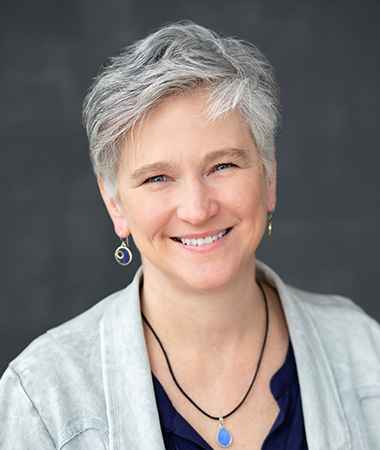First Person
Back Page: Bringing Climate Change Home

Cindy Frantz is the Norman D Henderson Professor of Psychology and Environmental Studies at Oberlin College. Her research focuses broadly on humans’ relationship with the natural world, with an emphasis on promoting sustainable behavior.
What led to your scientific interest in research related to humans’ relationship with the natural world?

For as long as I can remember, I have felt a strong pull to the natural world. As a kid I was outside as much as possible—we had a fabulous backyard full of adventure. I felt angry when I was stuck inside doing homework on a beautiful day; it just felt wrong. And I have always sought out natural areas in times of trouble or stress.
Tell us about your professional path and how you ended up in academia.
After college I had no idea what I wanted to do, but I knew it wasn’t more school. After working several jobs that provided minimal intellectual stimulation, I realized that thinking was an important part of what it meant for me to be living a good life. I also discovered that I needed to feel like I was creating positive change in the world. I fell in love with social psychology as an undergraduate because it is so useful for solving real-world problems. The intellectual stimulation combined with real-world value was (and still is) the perfect combination for me. I knew I didn’t want to become a college professor, however; I was too terrified of public speaking to think I could get up and lecture every day. Ironically, I find teaching and public speaking to be some of my favorite parts of my job as a professor! So, I encourage people not to make limiting assumptions about the future based on their current fears and weaknesses. We are all capable of so much change and growth.
Read all of the articles from the September/October Observer.
Your research helped lead to Oberlin’s Environmental Dashboard, which uses feedback technology to encourage conservation behavior, connect humans back to the natural world, and promote systems thinking. What kind of an effect has it had on behavior in the community, and why?
Modern humans live in an unprecedented way, completely disconnected from the physical systems that support our everyday lives. For example, our ancestors knew where their water came from because they hauled it themselves; they knew the quality of the stream or lake where they got it. That continuous flow of information—feedback, in systems-speak—helped them make timely decisions. We’ve lost that in the modern world. We don’t think about where our water comes from or where it goes, or about the energy it takes to deliver it and carry it away. Environmental Dashboard makes these invisible systems visible, provides actionable information, and primes environmental stewardship. Our research has shown that building occupants with access to feedback change their behavior to conserve more energy. We’ve also demonstrated that people in our community and schools think more about their resource use than do people without Environmental Dashboard, and that they are more likely to think about resource conservation as a collective action.
You also study social conflict, which seems particularly relevant in this time of unprecedented environmental catastrophe as well as polarization regarding climate change. What has your research found about the conversations, tactics, and strategies that can help bridge these divides and possibly even generate more support for addressing climate change?
The saying is that all politics is local. I think this is true for bridging political divides on climate change: neighbors talking to neighbors about how the local climate is changing, and what we need to do to prepare. My newest project explores the psychological impact of providing people with hyper-local climate model data. My collaborator John Petersen led a community climate-vulnerability assessment that I found highly psychologically impactful. We’re using the website for The Climate Explorer, which collects publicly available data from major organizations such as NASA and the U.S. Geological Survey, to share climate projections at the city, county, and ZIP code level. The hyper-local climate models bring climate change home, literally, which makes it very concrete. They also point the way toward important actions communities can take to prepare, which is empowering.
Back Page showcases particularly interesting work by a wide variety of psychological scientists. Know of a good candidate for a future profile? Contact the Observer at [email protected].
Feedback on this article? Email [email protected] or login to comment. Interested in writing for us? Read our contributor guidelines.





APS regularly opens certain online articles for discussion on our website. Effective February 2021, you must be a logged-in APS member to post comments. By posting a comment, you agree to our Community Guidelines and the display of your profile information, including your name and affiliation. Any opinions, findings, conclusions, or recommendations present in article comments are those of the writers and do not necessarily reflect the views of APS or the article’s author. For more information, please see our Community Guidelines.
Please login with your APS account to comment.